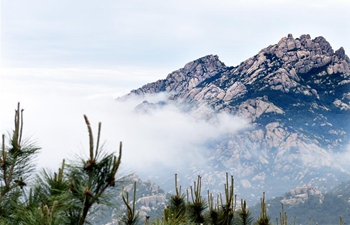URUMQI, May 26 (Xinhua) -- For 23 years Ma Xiaohua has been guarding 690 hectares of forest on the edge of the Gurbantunggut Desert to fight against desertification in northwest China.
On the southern edge of Gurbantunggut, China's second largest desert after Taklimakan, a 70-kilometer long belt of forest was grown by thousands of people with the Xinjiang Production and Construction Corps in the 1950s. To ensure the saplings survived, they fetched water from up to 50 kilometers away.
Ma took on his father's role as a forest ranger in 1995, when he was 23 and newly demobilized from the army.
"Not until my father passed away did I understand why he decided to stay here," said Ma. "There must be someone to protect the forest, even if he knew how hard the work is."
Ma has no neighbors, not even tap water. To irrigate the forest he sets out at 7:00 am every day.
"With a pump and pipes it's easier to fetch water from the well now. Simply turn on the valve, and every tree gets water," he said.
In the past he had to dig sand out of the canal before watering the trees. It took him at least a month to water all the trees.
Weather is a big challenge. The skin on his arms peels in the scorching summer and in winter, he has to endure bitter cold as the temperature drops to minus 40 degree Celsius. On windy and dusty days he can't even find the way home, and his hair, clothes and mouth are full of sand.
The worst woe is, of course, human. To stop illegal logging Ma patrols the forest on his second-hand motorcycle.
"Sometimes I am threatened. I was called 'a savage.' But I protect the forest, which is so precious in containing the desert," Ma said.
He almost lost his left eye when it was pricked by a thorny oleaster branch. He didn't bother to get treatment, and the infection was so bad that he lost much of his eyesight.
He had another accident in 2008, when he went to fix a faulty valve but fell off his motorcycle on a slippery road after the rain. He broke his collarbone, but he went back to work just a week after surgery. He also suffers from arthritis because his hands are often immersed in cold water.
"I've never thought of leaving," he said, not even when his father was sick in 2006 but he had to finish the irrigation. When he finally made it to the hospital, there were just three days left for the old man.
"My father told me to bury him beside the desert," he said.
With a monthly salary of 2,500 yuan (400 U.S. dollars), Ma can only afford 15 yuan for shoes. Fresh vegetables and meat are luxury.
He seldom goes home to see his wife and his son. "But they are all supportive of me," he said.
Under Ma's care and protection, survival rate of the trees in the forest exceeds 85 percent. The forest has become an important part of the Three-North Shelterbelt Forest Program. Launched in 1978 and expected to be completed by 2050, the project consists of afforestation in northwest, north and northeast China.
By 2015, the project has seen nearly 30 million hectares of forests planted and preserved.
China has made great progress against desertification in recent years. The area of desertified land in the country shrank by an annual average of 1,980 square km in the 2010-2014 period.

















